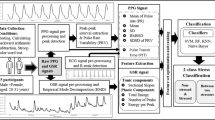Abstract
Stress acts as a triggering and aggravating factor for many diseases and health conditions. This has prompted the development of wearable devices capable of continuously and unobtrusively tracking physiological signals associated with stress levels. Moreover, data mining methods have been devised to extract valuable information from these signals, to detect and monitor stress more effectively. We argue that it is possible to accurately detect and differentiate physiological changes occurring at the early onset of stress, i.e., the anticipation stage, from those occurring in no-stress, stress, and post-stress conditions. To investigate it, we analyze biomarker data (blood volume pulse, skin conductance, skin temperature, and acceleration) collected from wrist sensors in two publicly available datasets, where psychosocial stress is induced under controlled laboratory conditions. We train and evaluate person-specific classification algorithms by using established learning approaches. We have discovered that the random forest classifier yields promising results in both detecting stress anticipation and distinguishing between the four considered classes. The results of this study suggest that wearable systems, incorporating sensors and stress monitoring algorithms like the ones introduced here, can become integral components of intervention systems aimed at addressing stress-related issues.
Access this chapter
Tax calculation will be finalised at checkout
Purchases are for personal use only
Similar content being viewed by others
References
Empatica E4 medical devices. http://www.empatica.com. Accessed 21 June 2024
Fitbit Sense 2 Smartwatch. https://bit.ly/3V5m7Z7. Accessed 21 June 2024
Allen, A.P., Kennedy, P.J., Dockray, S., Cryan, J.F., Dinan, T.G., Clarke, G.: The trier social stress test: principles and practice. Neurobiol. Stress 6, 113–126 (2017)
Amanvermez, Y., et al.: Effects of self-guided stress management interventions in college students: a systematic review and meta-analysis. Internet Interv. 28, 100503 (2022)
Amanvermez, Y.: Stress and stress management interventions in higher education students: Promises, Challenges, Innovations. Ph.D. thesis, VU E-Publishing (2023)
Andric, M., Ricci, F., Zini, F.: Sensor-based activity recognition and performance assessment in climbing: a review. IEEE Access 10, 108583–108603 (2022)
Boucher, P., Plusquellec, P.: Acute stress assessment from excess cortisol secretion: Fundamentals and perspectives. Front. Endocrinol. 10, 749 (Nov 2019)
Chawla, N.V., Bowyer, K.W., Hall, L.O., Kegelmeyer, W.P.: Smote: synthetic minority over-sampling technique. J. Artif. Intell. Res. 16, 321–357 (2002)
Dickerson, S.S., Kemeny, M.E.: Acute stressors and cortisol responses: a theoretical integration and synthesis of laboratory research. Psychol. Bull. 130(3), 355–391 (2004)
Garmin: Garmin vívosmart® 4: Activity Tracker with Heart Rate Monitor & Fitness Tools, https://www.garmin.com/en-US/p/567813. Accessed 21 June 2024
Greco, A., Valenza, G., Lanata, A., Scilingo, E., Citi, L.: cvxEDA: a convex optimization approach to electrodermal activity processing. IEEE Trans. Biomed. Eng. 63(4), 797–804 (2016)
Iqbal, T., et al.: Stress monitoring using wearable sensors: a pilot study and stress-predict dataset. Sensors 22(21), 8135 (2022)
Ivanova, I., Andric, M., Janes, A., Ricci, F., Zini, F.: Climbing activity recognition and measurement with sensor data analysis. In: Companion Publication of the 2020 International Conference on Multimodal Interaction. ICMI ’20, ACM
Jaimes, L.G., Gagneja, K., Akbas, M.I., Vergara-Laurens, I.J.: Future stress, forecasting physiological signals. In: 2017 IEEE 7th Annual Computing and Communication Workshop and Conference (CCWC), IEEE (Jan 2017)
Martinez, R., Salazar-Ramirez, A., Arruti, A., Irigoyen, E., Martin, J.I., Muguerza, J.: A self-paced relaxation response detection system based on galvanic skin response analysis. IEEE Access 7, 43730–43741 (2019)
McEwen, B.S.: Protective and damaging effects of stress mediators. N. Engl. J. Med. 338(3), 171–179 (1998)
O’Connor, D.B., Thayer, J.F., Vedhara, K.: Stress and health: a review of psychobiological processes. Annu. Rev. Psychol. 72(1), 663–688 (2021)
Pan American Health Organization Caribbean Development Bank: Doing what matters in times of stress. Pan American Health Organization (Aug 2021)
Peake, J.M., Kerr, G., Sullivan, J.P.: A critical review of consumer wearables, mobile applications, and equipment for providing biofeedback, monitoring stress, and sleep in physically active populations. Front. Physiol. 9 (Jun 2018)
Schmidt, P., Reiss, A., Duerichen, R., Marberger, C., Van Laerhoven, K.: Introducing WESAD, a multimodal dataset for wearable stress and affect detection. In: Proceedings of the 20th ACM International Conference on Multimodal Interaction. ICMI ’18, ACM (Oct 2018)
Schneiderman, N., Ironson, G., Siegel, S.D.: Stress and health: psychological, behavioral, and biological determinants. Annu. Rev. Clin. Psychol. 1(1), 607–628 (2005)
Schulte-Frankenfeld, P.M., Trautwein, F.: App-based mindfulness meditation reduces perceived stress and improves self-regulation in working university students: A randomised controlled trial. Appl. Psychol. Health Well Being 14(4), 1151–1171 (2021)
Sokolova, M., Lapalme, G.: A systematic analysis of performance measures for classification tasks. Inform. Process. Manage. 45(4), 427–437 (2009)
Taylor, J.L., Muscatello, R.A., Corbett, B.A.: Differences in anticipatory versus reactive stress to social evaluative threat in adults versus adolescents with autism. Autism Res. 11(9), 1276–1285 (2018)
Umberson, D., Liu, H., Reczek, C.: Stress and health behaviour over the life course. Adv. Life Course Res. 13, 19–44 (2008)
Umematsu, T., Sano, A., Taylor, S., Tsujikawa, M., Picard, R.W.: Forecasting stress, mood, and health from daytime physiology in office workers and students. In: Proceedings of the 42nd Annual International Conference of the IEEE Engineering in Medicine and Biology Society (EMBC). IEEE (Jul 2020)
van der Valk, E.S., Savas, M., van Rossum, E.F.C.: Stress and obesity: are there more susceptible individuals? Curr. Obes. Rep. 7(2), 193–203 (2018)
Vos, G., Trinh, K., Sarnyai, Z., Rahimi Azghadi, M.: Generalizable machine learning for stress monitoring from wearable devices: a systematic literature review. Int. J. Med. Inform. 173, 105026 (2023)
Acknowledgments
We acknowledge the support provided by the PNRR initiatives: INEST (Interconnected North-East Innovation Ecosystem), project code ECS00000043, and FAIR (Future AI Research), project code PE00000013. These projects are part of the NRRP MUR program, funded by the NextGenerationEU. We extend our gratitude to the anonymous reviewers for their valuable feedback.
Author information
Authors and Affiliations
Corresponding author
Editor information
Editors and Affiliations
Rights and permissions
Copyright information
© 2024 The Author(s), under exclusive license to Springer Nature Switzerland AG
About this paper
Cite this paper
Andrić, M., Dragoni, M., Ricci, F. (2024). Anticipating Stress: Harnessing Biomarker Signals from a Wrist-Worn Device for Early Prediction. In: Finkelstein, J., Moskovitch, R., Parimbelli, E. (eds) Artificial Intelligence in Medicine. AIME 2024. Lecture Notes in Computer Science(), vol 14844. Springer, Cham. https://doi.org/10.1007/978-3-031-66538-7_39
Download citation
DOI: https://doi.org/10.1007/978-3-031-66538-7_39
Published:
Publisher Name: Springer, Cham
Print ISBN: 978-3-031-66537-0
Online ISBN: 978-3-031-66538-7
eBook Packages: Computer ScienceComputer Science (R0)





